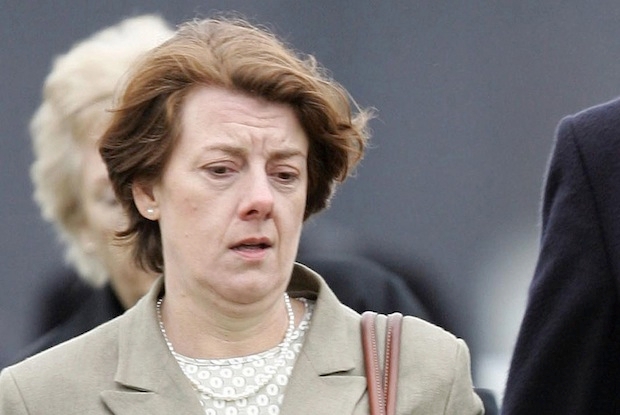Can someone please explain to me why the BBC newsreaders were not wearing black armbands last weekend when reporting the tragic story of Sally Morgan being given the boot from Ofsted? In all other manners the coverage was adequately respectful and the reporters, rightly, allowed their anguish to bleed through the fraying bandage of impartiality. Not enough, mind – I could have done with some real weeping and tearing at the hair: how could this brilliant and exciting woman be so traduced? The Tories are trying to take over everything! You’d have thought they’d won an election, or something. How dare they.
I wonder which public institution will be the next grateful harbour for Baroness Morgan? You can bet your life she will wash up somewhere, almost certainly without the sort of process you or I would have to go through to get a job. You might have thought there would be an opening at the Environment Agency, what with its chaotic response to the recent inclement weather — but no, Baron Smith, another Labour peer, is clinging on to his job, despite admitting that the East Anglian coastline will soon begin somewhere near Sudbury. But there are an almost infinite number of other quangos and public bodies and charidees for which the only qualifications needed are to have amenable, centre-left opinions and to have friends in think tanks and the like.
The BBC itself, for example, might be a good place for Sally — now that Caroline Thomson, the former somewhat tarnished ‘Chief Operating Officer’, has left to run the English National Ballet. Didn’t know Caroline could dance, did you? On the head of a pin, reader, on the head of a pin. Ms Thomson is also known as Lady Liddle, through her marriage to that New Labour scullion or eminence Roger (now Lord) Liddle. No relation, I hasten to add. I mean no relation to me — obviously Lord and Lady Liddle are related, they’re married. Almost every public job in the country is occupied by this sort of person, each of them occupying several berths in multifarious institutions which largely depend upon your wallet to exist. I invented a game you can play based upon these monkeys, the people who run everything. It’s called ‘Six Degrees of Shami Chakrabarti’, and what you do is pick a quango or public institution at random, and then pick a name from the board of that institution at random and see how many moves it takes to get you to Shami Chakrabarti. It’s usually a lowish number, like one or two. Sally Morgan to Shami you can do in two moves: Sally’s married to the barrister John Lyons, former chair of Liberty, of which organisation Shami is the current director. Bingo. There are probably about 50 other routes. These are the people who run us: agreeable people with civilised views, as they would see them, usually — although not always — public-school-educated, faux leftish and unelected.
Watching the news these last few days, one other thought occurred. Aside from the shocking news of Sally Morgan’s defenestration, the other story to dominate the headlines was the death of an actor familiar, I would have thought, to a very small minority of viewers and listeners. Philip Seymour Hoffman was found dead in his apartment with a syringe of skag hanging out of his arm. This is undoubtedly very sad, but the coverage afforded his rather sordid demise was out of all proportion to his popularity. I suppose the average cinema-goer may vaguely recall the chap from the most recent instalment of The Hunger Games, Catching Fire, in which his billing in the cast was somewhere around about number 13. Or perhaps from his performance in one edition of the Mission Impossible franchise, where he ranked second to Tom Cruise.
But I do not think that either of these films are why Hoffman was afforded such a send-off from the British media, and in particular from the BBC. We were told, at every available moment, that he was the ‘finest character actor’ of his generation — and what this means, I suspect, is that he was in the sort of films that people who work for the BBC like to watch. Dialogue-heavy, slightly off-kilter films, such as those directed by Joel and Ethan Coen and Paul Thomas Anderson. Films which do not do terribly good business at the box office but which with-it middle-class people who wear black and work in the media rather enjoy.
People like me, as it happens — I enjoy all those films too and, with the exception of Mission Impossible and The Hunger Games, have seen almost every film Hoffman has been in. But I was reminded a little of the death of Lou Reed — a musician who, again, I’ve always liked, because I am one of these people I’m talking about — whose resonance with the British consciousness lasted for about six weeks in 1972 after the release of the single ‘Walk on the Wild Side’. Lou was somebody revered by the artsy types who work in the media, and especially the BBC, but had no real impact beyond this rather arrogant clique which thinks that the stuff it likes is hugely important. (And I bet Sally Morgan’s got Lou’s album Transformer.) Can you imagine the BBC going overboard if Jean-Claude van Damme suddenly died, or even Will Ferrell? I’m telling you, if the Coen brothers suddenly peg out it’ll be like Mandela all over again.







Comments